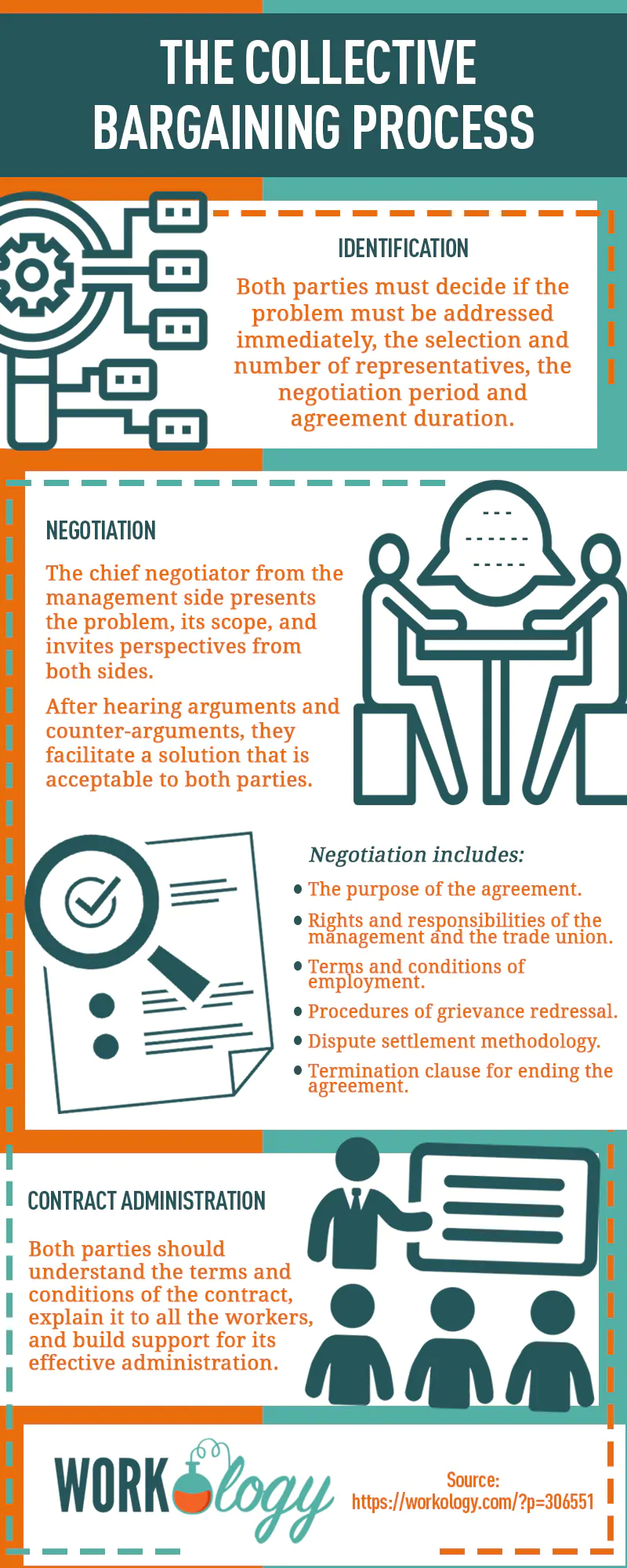When you are studying for your SHRM or HRCI Certification, it’s important to have a basic understanding of topics like the union bargaining process. Collective bargaining is the process in which working people, through their unions, negotiate contracts with their employers to determine their terms of employment, including pay, benefits, hours, leave, job health and safety policies, ways to balance work and family, and more.
What You Need to Know About Collective Bargaining for Your HR Exam
The objective of bargaining is to settle matters on discussion tables with mutual consent and cooperation. Management is usually represented by senior executives of the company and the workers are represented by the trade union leaders and officials. The purpose of collective bargaining is to reach a collective bargaining agreement (CBA).
Steps in the Union Bargaining Process
Our content continues after the ad.
Ads help make OUR resources free for everyone.
We respect your privacy. To see our Privacy Policy
click here.
The collective bargaining process has three main stages:
Identification: Both parties must decide if the problem must be addressed immediately, the selection and number of representatives, the negotiation period, and agreement duration.
Negotiation: The chief negotiator from the management side presents the problem, its scope, and invites perspectives from both sides. After hearing arguments and counter-arguments, they facilitate a solution that is acceptable to both parties. Negotiation includes the purpose of the agreement, rights, and responsibilities of the management and the trade union, terms and conditions of employment, procedures of grievance redressal, dispute settlement methodology, and termination clause for ending the agreement.
Contract Administration: Both parties should understand the terms and conditions of the contract, explain it to all the workers, and build support for its effective administration.
What is a CBA?
A collective bargaining agreement (CBA) is a written legal contract between an employer and a union representing the employees. The CBA is the result of extensive negotiation between the parties regarding topics such as pay, benefits, working conditions, and terms and conditions of employment.
There are three different categories of subjects that are part of a CBA:
Mandatory: These are topics required by law and the National Labor Relations Board (NLRB). Those subjects include items like wages, overtime, bonuses, grievance procedures, safety and work practices, and seniority, as well as procedures for discharge, layoff, recall, or discipline.
Voluntary or permissive: These may be negotiated, but are not required, and include topics such as internal union matters and the make-up of the employer’s board of directors.
Illegal: Topics that would violate a law are prohibited, such as closed shops (when an employer will hire only members from a union) or illegal discrimination.
Once a CBA is reached, both the employer and the union are required to abide by that agreement. Companies will typically either have in-house counsel involved or engage outside legal counsel to represent them in this process.
Types of Collective Bargaining
The types of collective bargaining are different from the stages of union bargaining, and you’ll want to know when to use which type as you go into your SHRM or HRCI Certification test. While memorization is helpful, you’re going to want to know which of these to select when presented with situational judgment questions on your HR Certification exam.
Distributive Bargaining: A negotiation process in which one party benefits at the other’s expense. This usually refers to the redistribution of income in the form of higher wages, higher bonuses, or higher financial benefits – typically anything related to money. Because unions can call an employee strike, if a trade union has 100% representation within the employer’s workforce, it could cause significant disruption to a company.
Integrative Bargaining: Both sides aim to benefit, also called ‘win-win’ bargaining. Both parties may bring together a list of demands by which an agreement is reached that benefits both parties, and each loses or gains by the same amount.
Productivity Bargaining: Involves both parties negotiating around productivity and pay. Unions may suggest that higher salaries would boost productivity and suggest new ways of organizing the workforce that will increase productivity. In exchange, an employer would increase wages as a result of increased productivity.
Composite Bargaining: A negotiation that focuses on items that are not related to pay, generally related to employee welfare and job security. This could include factors such as working conditions, policies, recruitment, and disciplinary processes.
Concessionary Bargaining: Based on unions giving back previous benefits to the employer. For example, a trade union may agree to lower wages in return for job security during an economic decline in which job security is more important than higher wages. This can benefit the company, as they won’t have to lay off employees. The goal is generally to strengthen the business in order to ensure its success long-term.
We have new quiz and practice test questions that have been added to the Ace the HR Exam course that you can find at AcetheHRexam.com (there are more than 180 study questions!). These practice questions are perfect for the PHR, SHRM, SHRM-SCP, or SHRM-CP. If you haven’t signed up yet, we also have 25 free quiz questions that you can access at HR Exam Practice Test.
Looking for more resources and a community to connect with as your prepare for your HR certification exams? Join 5,000 HR professionals who are doing the same on our Facebook HR Certification Study Group.












